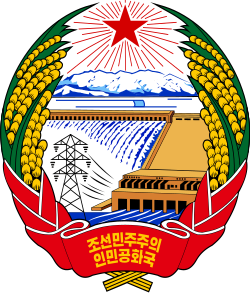History
A few days before the end of Japanese colonial rule, the last Japanese governor-general of Korea Nobuyuki Abe gave their approval for the formation of a political party in northern Korea. The founders of the party named it the National Party, which was founded on 30 August 1945. during the Soviet administration of northern Korea, the party was renamed to the National Socialist Party, intending to gain favor from the Soviet Union. However, the similarity of the party's name to the Nazi Party led it to be dissolved by Soviet authorities. [1] : 93 In September 1945, several influential Christians including Yun Ha-young and Han Kyong-jik founded the Christian Social Democratic Party. The party was largely based in Sinuiju, and was later renamed to the Social Democratic Party to gain larger support, but eventually disintegrated after its suppression due to a student protest on 22 November. [2]
On 12 October 1945, Soviet authorities allowed the creation of political parties in northern Korea, leading to the establishment of the North Korean Branch Bureau of the Communist Party of Korea. This was followed by the establishment of the Korean Democratic Party on 3 November by Cho Man-sik, who was later removed from his position as party leader in January 1946 due to opposing a four-power trusteeship backed by the Soviets. In January 1946, Kim Il Sung met with the representatives of Cheondoism and approved their request to form their own party, who then formed the Chondoist Chongu Party on 8 February. This was followed by the establishment of the New People's Party of Korea, featuring members of the Yan'an faction of independence fighters who had been to China. On 10 April, the North Korean Branch Bureau became independent of the CPK and changed its name to the Communist Party of North Korea. On 28 August, the Communist Party of North Korea and the New People's Party of Korea merged to form the Workers' Party of North Korea. [2]
In 1948, the Workers' Party of North Korea founded the Democratic People's Republic of Korea. On 24 June 1949, it merged with the Workers' Party of South Korea to form the Workers' Party of Korea, and has remained the sole ruling party of North Korea since. Other minor parties, such as the Korean Democratic Party (which was later renamed to the Korean Social Democratic Party in 1980) and the Chondoist Chongu Party, were quickly made subservient and incorporated to the Democratic Front for the Reunification of Korea (DFRK). Since then, the WPK been constitutionally guaranteed a leading role in North Korea, with the two minor parties operating under its leadership. [3]
This page is based on this
Wikipedia article Text is available under the
CC BY-SA 4.0 license; additional terms may apply.
Images, videos and audio are available under their respective licenses.
